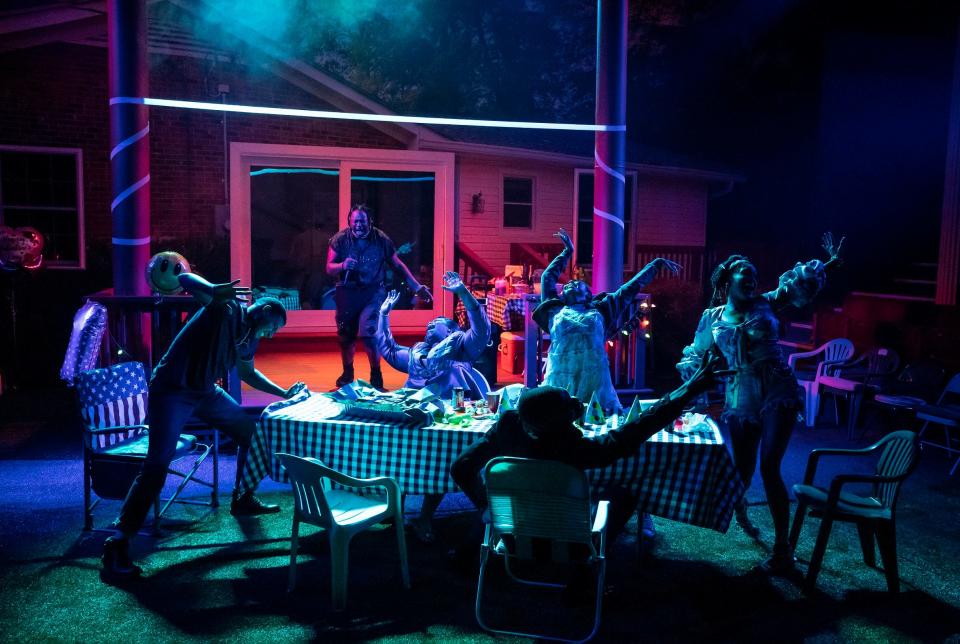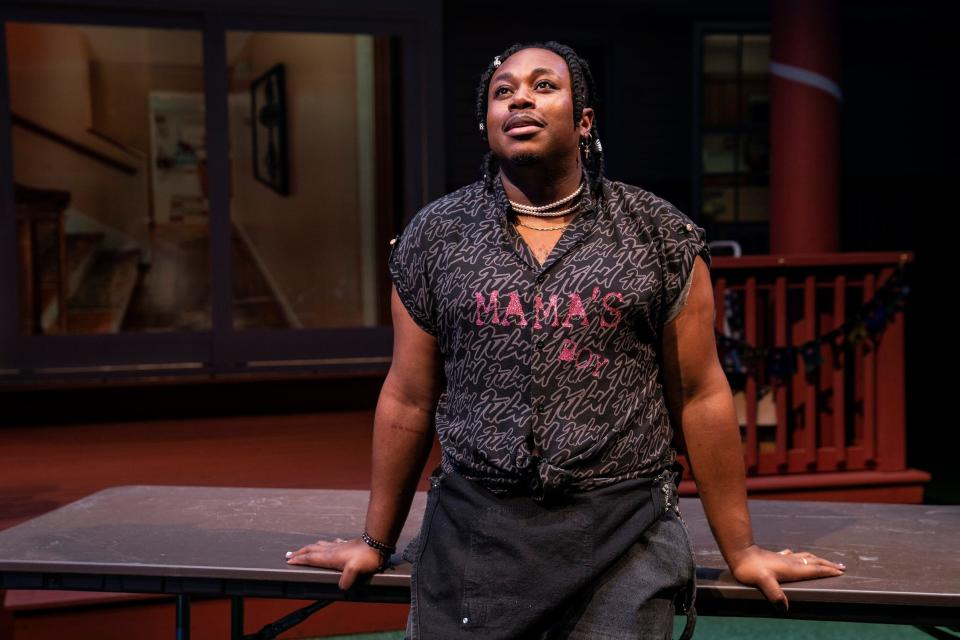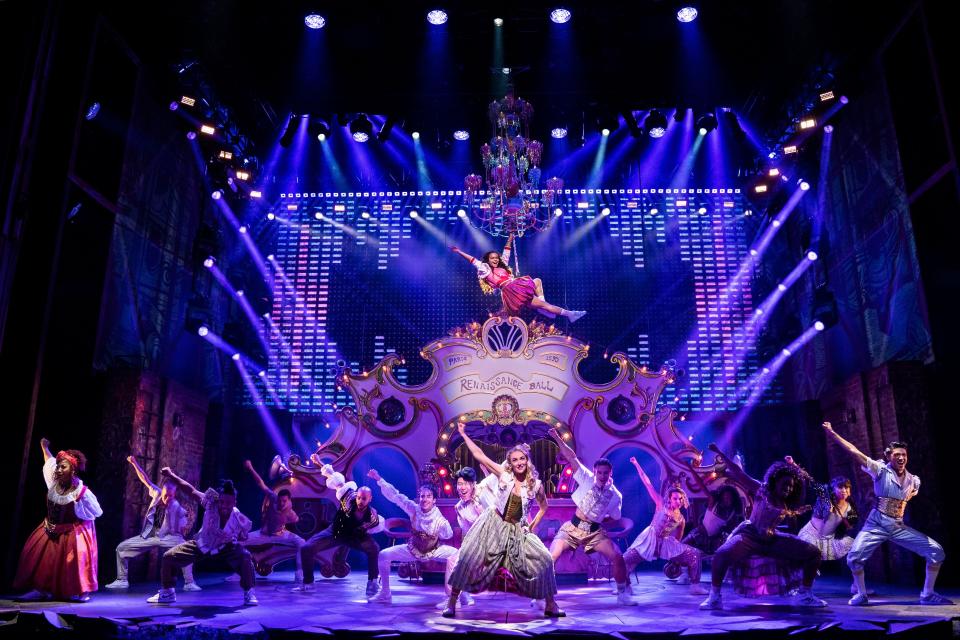Shaking up Shakespeare with two crazy Broadway offerings
Is nothing sacred?
Is Hamlet, The Melancholy Dane, now to be a conflicted college kid at a backyard barbecue?
Are the young lovers of "Romeo and Juliet" now to express themselves in Britney Spears, Katy Perry and Backstreet Boys songs?
If you're inclined to ask such questions about "Fat Ham" and "& Juliet" — two top offerings of Broadway, 2023 — keep in mind that 17th century audiences might have had the same kinds of objections to Shakespeare. His plays were adaptations, too.

"We're always in conversations with the stories that have already been told," said James Ijames — pronounced "I'ms" — whose "Fat Ham," opening at the American Airlines Theatre April 12 (previews begin March 21) is one of Broadway's most buzzed-about new productions. "Fat Ham" got attention, and rave reviews, when it ran in Philadelphia and then off-Broadway at the Public Theater. In 2022, it took home a Pulitzer Prize.
Stop us if you've heard this
The Hamlet of his play is "Juicy," a queer undergrad of color (Marcel Spears) whose family barbecue in North Carolina is a fraught affair because — see if this rings a bell — his uncle happens to have murdered his father and married his mother.

"Fat Ham" is more a comedy than a tragedy, Ijames says. But it still has Shakespeare's basic setup: Ghost Dad pops in demanding his son avenge his murder. And that gives Ijames a springboard to talk about cycles of violence, toxic masculinity, queerness, and a host of other very modern issues. "I ain't never killed nobody," Juicy laments. "Yeah, I think it's probably mad hard," says his cousin Tio (Chris Herbie Holland). Tio, as in "HoraTio."
The familiarity is the hook. Everyone thinks they know "Hamlet." That's what makes "Fat Ham" so much fun. "There's a perception on the part of the audience that they know what this journey is going to be," Ijames said. "Then you subvert it, take a detour."
Which is just what Shakespeare was doing in his own "Hamlet."
Tale as old as time
Everyone thought they knew "Hamlet." There were "Hamlet" stories going back to the 13th century. There had been a "Hamlet" play just 11 years prior to Shakespeare's. Audiences, in 1600, were primed for the old chestnut about the small boy who has to keep himself alive until he grows old enough to avenge his father's murder.
What they got was something else. An already grown-up prince — whose weird shilly-shallying has fascinated theatergoers for 400 years. Shakespeare liked to play with audience expectations. He killed off King Lear, subverting the happy ending of previous versions. His "Romeo and Juliet" turned the original story on its head. The reckless young lovers were the good guys. The disapproving adults were the bad guys.
"It was a way of surprising his audience," said Stark Sands, one of the leads of "& Juliet," the jukebox musical that opened at the Stephen Sondheim Theatre on Nov. 17.

"Audiences knew these stories," Sands said. "And he would throw a twist in there to keep them on their toes."
He should know. In "& Juliet," Sands is Will Shakespeare himself — upstaged by wife Anne Hathaway (Betsy Wolfe), who insists on rescuing Juliet (Lorna Courtney) from the grave and sending her out on a whole new series of romantic adventures.
"We have a built-in audience," Sands said. "You probably know the music, unless you're very young. And everybody has some acquaintance with 'Romeo and Juliet.' "

Messing with the masters
Some of them involve that favorite Shakespeare topic, gender non-conformity ("Twelfth Night," "As You Like It"). And all involve the tunes of Max Martin, the Swedish pop songwriter responsible for such megahits as "Oops!... I Did It Again," "Roar," and "I Want it That Way." Those are just some of the familiar tunes in this glitzy production, which came to Broadway from the West End.
"Beyond the fun you have in this show, there are multiple messages you can latch onto and walk away with," Sands said.
These two shows are hardly the first to play games with The Swan of Avon. "Rosenkranz and Guildenstern are Dead," "West Side Story," "MacBird!" "Ubu Roi" are just some of the famous plays that riff on Shakespeare. And, as Ijames points out, they're part of a larger tradition.
"Mourning Becomes Electra" is Eugene O'Neill's answer to Sophocles. "Vanya and Sonia and Masha and Spike" is Christopher Durang's answer to Chekhov. Lorraine Hansberry's "A Raisin in the Sun" inspired not one but two answer plays: "Clybourne Park" by Bruce Norris, and "Beneatha's Place" by Kwame Kwei-Armah. Playwrights have always engaged with their predecessors.
"I think it's because we want to talk to them," said Ijames, a Philadelphia resident who will be turning his attention, in future projects, to two other Shakespeare characters: Othello and Cleopatra.

"I can't talk to Shakespeare," Ijames said. "I can't sit down and say, 'What made you think of that?' or 'Why did you make that choice?' This is a way to sort of be in conversation with those writers."
Just as Shakespeare was in conversation with the writers who came before him.
"Shakespeare, Chekhov, Lorraine Hansberry, Amiri Baraka — those are the four writers I carry around as a kind of artistic DNA," Ijames said. "Throw a little James Baldwin in there and you have me."
If you go...
"Fat Ham," American Airlines Theatre, 227 W. 42nd St. Previews begin March 21. fathambroadway.com
"& Juliet," Stephen Sondheim Theatre, 124 W. 43rd St. andjulietbroadway.com
This article originally appeared on NorthJersey.com: Two new Broadway plays give Shakespeare a twist

